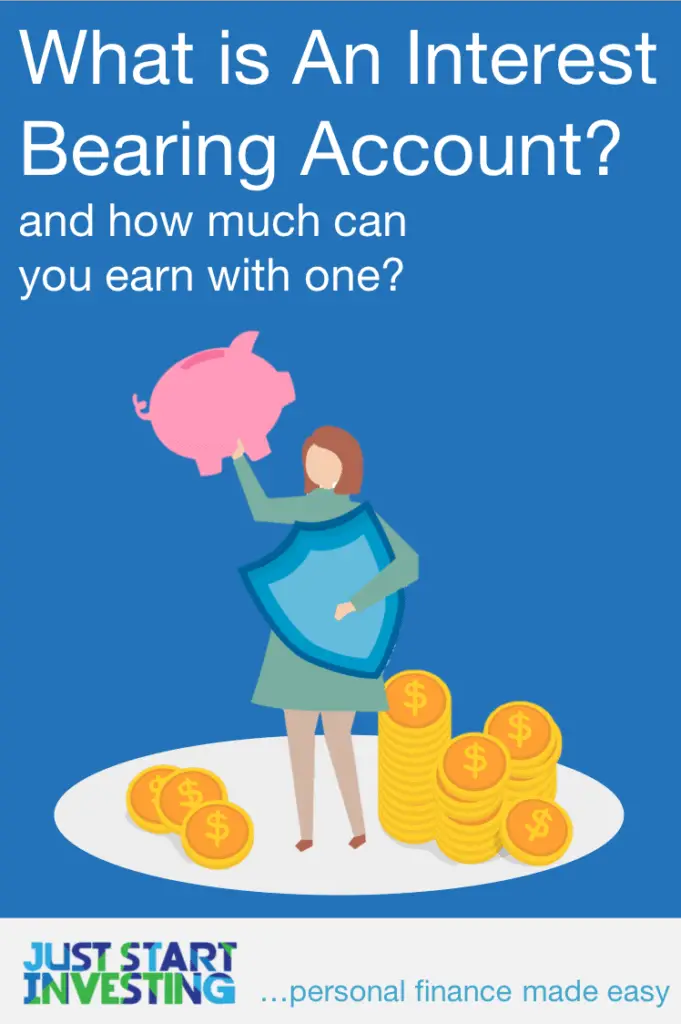Oftentimes, one of the first things you should do to get your personal finances in order is to set up an interest bearing account, like a savings account.
This type of account is way safer than putting your cash under the mattress and earns more interest than a checking account.
If your financial goals include building an emergency, saving for a down payment, or preparing for college, an interest bearing account can likely help you achieve them.
CIT Savings Builder Account:
What is an Interest Bearing Account?
An interest bearing account is a bank account that pays you to hold your money.
We’ll outline the different types of interest bearing accounts below for you to compare, which include three popular options: savings accounts, money market accounts, and certificates of deposit (CDs).
Interest-Bearing Account Definition: A type of bank account that will earn interest.
All of these accounts offer an annual percentage yield (APY), which is the amount of interest that is paid out each year. For example, if your APY or interest rate was 1%, and you had $10,000 in that bank account, you would receive $100 annually. Usually, this money is paid monthly, so in this case, you would receive $8.33 every month.
Banks can afford to pay you to hold your money because your money is not actually there.
Banks only keep a certain amount of liquid assets on hand, and the rest they loan out to businesses and consumers. Your mortgage is likely someone else’s savings account!
For example, if the bank is paying you 1% interest, they are likely charging someone else 3% interest on the same money.

3 Major Types of Interest Bearing Accounts
Below we’ll dive into the three major types of accounts, all of which are FDIC-insured (federal deposit insurance corporation) assuming you open them with FDIC-insured banks, credit unions, or financial service providers.
1. Savings Account
A savings account is probably the most common type of interest bearing account.
It’s an FDIC-insured bank account that offers a higher interest rate than checking accounts. In most cases, going with a high yield savings account is even better than traditional savings accounts because as you might have guessed, they offer higher interest rates.
High yield accounts are most commonly offered by online banks, such as CIT Bank or Discover Bank, rather than big banks like Chase and TCF that offer a low interest rate on a regular savings account.
High yield savings accounts are flexible accounts that are great for storing emergency funds and for short term savings overall. Its main limitation is that you can only access it and make transfers six times a month, although it’s hard to foresee a reason to need to access it any more than that. Especially if you connect your account with an online checking account to help manage your finances.
Last, it’s important to call out two additional things on savings accounts.
For one, the interest rate on savings accounts can change. This can be a good or bad thing depending on which way the interest rates move.
Second, a savings account may have an initial deposit or minimum balance requirement in order to qualify for a higher interest rate. Ensure you understand those account balance rules before signing up!
2. Money Market Deposit Account
A money market account is a hybrid of a savings account and checking account, as it offers:
- Limited accessibility and withdrawals, like a savings account
- Check writing ability, and sometimes even debit cards, like a checking account
However, instead of being the best of both worlds, money market accounts are actually very niche in my opinion.
Most high yield savings accounts offer interest rates on par with or better than money market accounts, so unless you have a specific need to be able to write checks or use a debit card with this account, I don’t see a need to have one.
Plus, money market accounts typically have stricter rules around an account minimum deposit and monthly maintenance fees.
3. Certificate of Deposit (CDs)
The last account type on the list is a certificate of deposit (CDs).
A CD is an account with a fixed time period over which it pays higher than average interest rates.
For example, a 5-yr CD right now through Discover is offering a 0.8% interest rate. On the other hand, Discover’s high-yield savings account is offering just a 0.6% interest rate. You get rewarded for agreeing to lock your money up for a longer period of time.
The catch is that if you need to access your money sooner, fees will likely be involved.
This is why CDs are great for known purchases that are coming in the short term. For example, college expenses or a vacation you have planned.
Why You Should Use an Interest Bearing Account
An interest bearing account is typically viewed as a low risk, low return personal finance product.
Should you put all of your retirement savings in one?
No, probably not.
However, an interest bearing account could be good for:
- An emergency fund
- Saving for a down payment
- Putting money aside for short term education expenses
- Saving for a car
- A fund for vacations and other higher-cost “wants”
If you plan to use the money in the next couple of years and don’t want to risk putting it into the stock market or even a bond fund, an interest bearing account can help ensure you get some at least some return on your money as you wait to use it.

Summary: Interest Bearing Accounts
Personally, my favorite type of interest bearing account is a high yield savings account, typically found through an online bank.
Usually, it offers returns on par with (if not better than) a money market account, and I like having the flexibility to access my money at any time, unlike with a CD.
If you’re wanting to get started with a high yield savings account, you can check out CIT Bank or Discover, or find the absolute best interest rate by searching around and referencing the full list of best bank accounts here.
Just Start Investing is a personal finance website that makes investing easy. Learn the simple strategies to start investing today, as well as ways to optimize your credit cards, banking, and budget. Just Start Investing has been featured on Business Insider, Forbes, and US News & World Report, among other major publications for its easy-to-follow writing.
